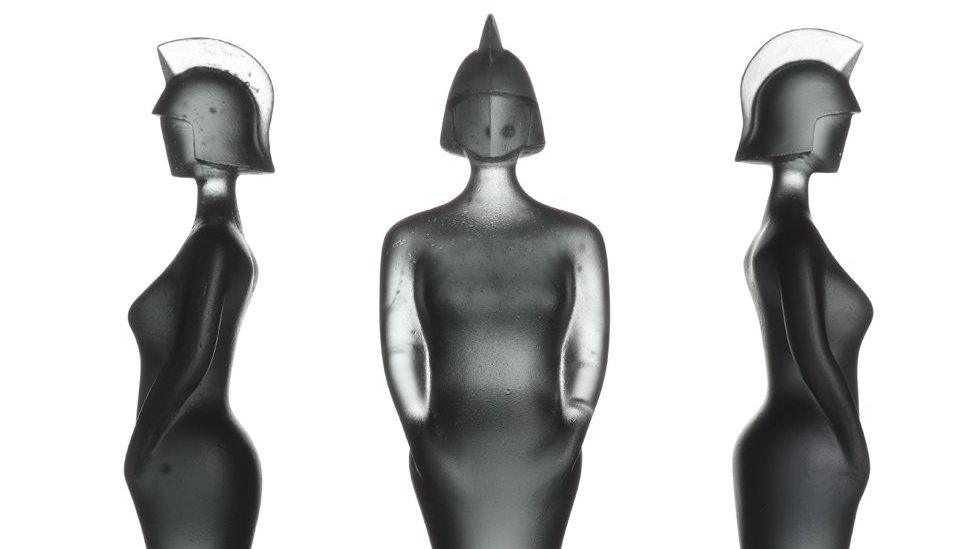Berlin Film Festival awards gender-neutral acting prize to Maren Eggert
- Published
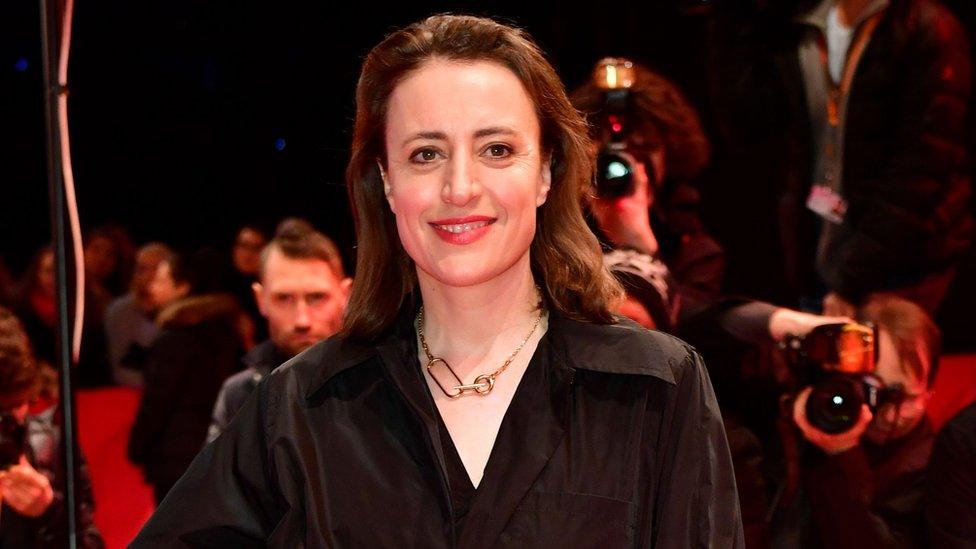
Maren Eggert, pictured in 2019, won for her performance in I'm Your Man
The Berlin Film Festival has awarded its first ever gender-neutral acting prize to Maren Eggert.
The new award, which was announced by the festival last August, means both male and female actors now compete in the same category.
German actress Eggert won for her performance as a museum researcher in the sci-fi comedy, I'm Your Man, external.
Berlin's decision to merge the categories could have a knock-on effect on other film award ceremonies.
The idea has previously been welcomed by screen stars such as Cate Blanchett and Tilda Swinton, but it has also sparked heated debate.
Mariette Risenbeek, director of the Berlin Film Festival said genderless award was intended to spark further discussions around gender justice.

Could the Oscars do the same?
Analysis by Steven McIntosh, entertainment reporter
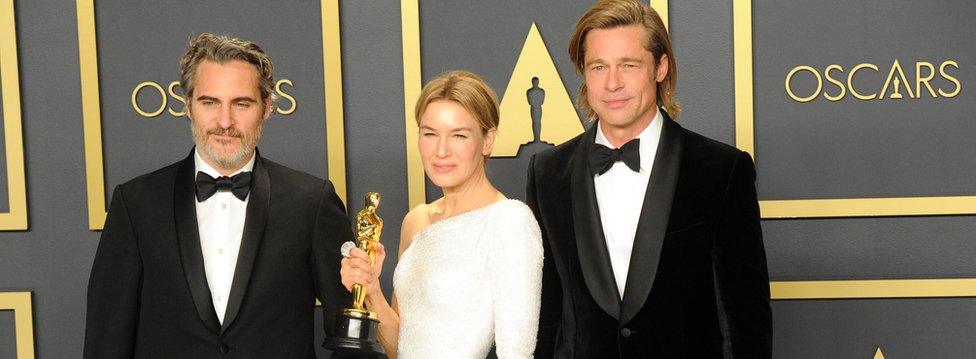
Joaquin Phonix, Renée Zellweger and Brad Pitt were among last year's Oscar winners
It may only be a matter of time before major awards ceremonies merge their acting categories - but this is a more complicated debate than it looks.
For starters, it's unlikely that a group of Hollywood stars - probably the most self-involved and self-congratulatory group of people in the world - would be enthusiastic about halving the number of awards they give themselves every year.
More importantly, it could actually be a disadvantage for actors who would currently be recognised.
Let's take an example. Suppose last year's two Oscar winners for best actress and actor, Renée Zellweger and Joaquin Phoenix, had competed in one big overarching category. Now suppose Phoenix won. That means a woman, who would otherwise have rightfully taken home a trophy, would be left empty-handed.
In the current climate, it's not hard to imagine the scandal if, in the long-term, a decision like this led to a repeated loss of recognition for worthy winners, particularly women.
So while some will argue gender-neutral categories are socially progressive, they will also have unintended consequences. It could, interestingly, lead to a battle between two different factions of equality campaigners.
At the same time, the changing societal landscape needs to be considered. Trans people aren't discriminated against by the current model (Laverne Cox would currently qualify for best actress, for example), but gender-neutral people are. The existing situation leaves gender-neutral actors without a category to apply for, and awards bodies will be eager to rectify that in the future as more people identify as such.
All things considered, it's a complicated debate with no easy answers. It will be fascinating to see whether the Baftas, Oscars, Globes or Emmys follow Berlin's lead.

Most arts and entertainment events, including the Oscars, the Baftas, the Grammys and the Brits, all still have separate award categories for males and females.
In 2019, the Brit Awards said they will review the way they distribute prizes, with one option being the abolition of separate male and female categories.
Berlin Film Festival: What are the highlights?
In September, speaking at the Venice Film Festival, Tilda Swinton said she was "really happy" to hear of Berlin's decision, as the idea of gendered prizes was outdated; adding that it was "pretty much inevitable that everybody will follow".
"In every sense, you know, dividing people up and and prescribing a path for them, whether we're talking about gender, or whether we're talking about race or about class," she said. "It's just such a waste of life."
Cate Blanchett, at the same event, noted how she had "always referred to myself as an actor", as opposed to an actress.
"I am of the generation where the word actress was used almost always in a pejorative sense," she said. "So I claim the other space."
Back in 2017, Emma Watson won the MTV Movie and TV award for best big-screen actor - the first gender-neutral prize the ceremony had given out.
In her acceptance speech, the actress said winning the prize for her role in Beauty and the Beast was "very meaningful".
"To me, it indicates that acting is about the ability to put yourself in someone else's shoes, and that doesn't need to be separated into two different categories."
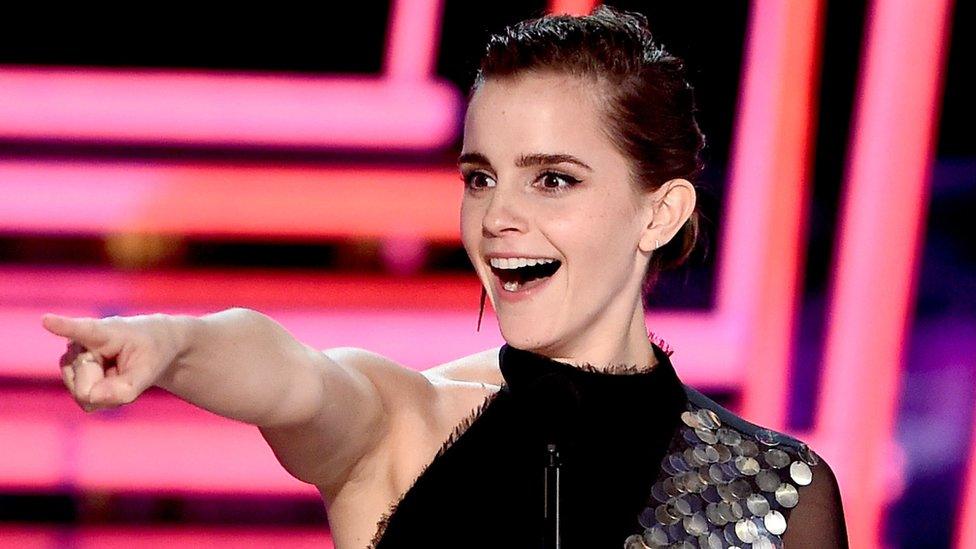
Watson said winning the prize was "very meaningful"
Elsewhere in Berlin on Friday, the festival's top prize - aka the Golden Bear for best film - went to Radu Jude for the sexually explicit Romanian comedy Bad Luck Banging or Loony Porn.
Israeli director Nadav Lapid announced the winner, saying the film - which satirises pandemic-era social hypocrisy with the story of a teacher whose sex tape winds up on the internet - succeeded in "provoking the spirit of our time... by slapping it, by challenging it to a duel".
The winning director told reporters that while he was pleased, he was "more happy that nobody got sick" during filming.
"We proved that we could do it respecting the people and putting their health above art," he said.
Eggert said she was "overwhelmed", external to have collected the festival's Silver Bear prize for best leading performance.
I'm Your Man, directed by Maria Schrader, sees her play an antiquities researcher who signs up to test a humanoid robot [played by Downton Abbey's Dan Stevens] as a romantic partner.
Speaking about why she won the prize, Bosnian director and jury member Jasmila Žbanić, said Eggert created a "memorable character" which encouraged viewers to think about "what we really want from ourselves".

Follow us on Facebook, external, or on Twitter @BBCNewsEnts, external. If you have a story suggestion email entertainment.news@bbc.co.uk, external.
Related topics
- Published8 May 2017
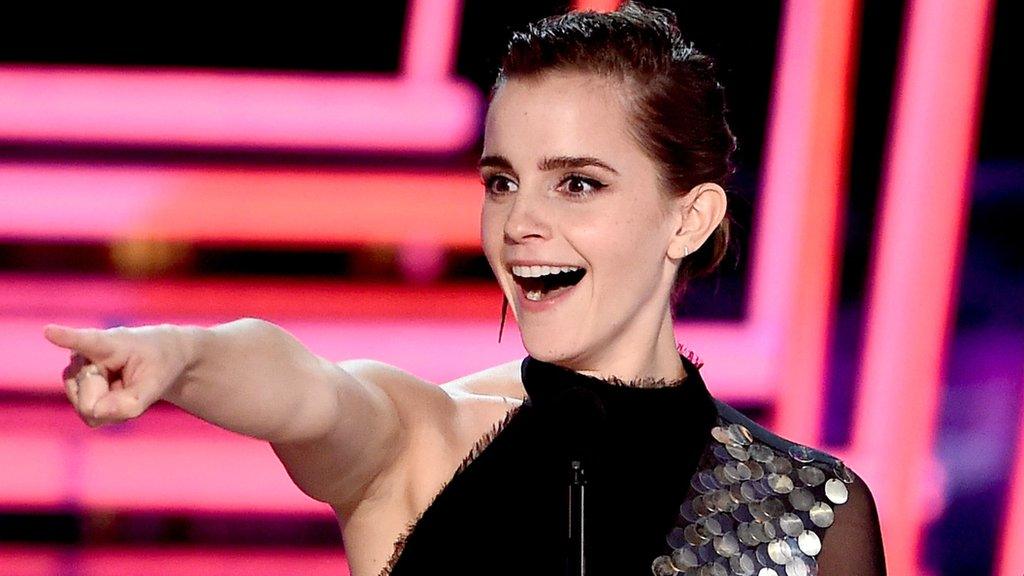
- Published23 September 2019
